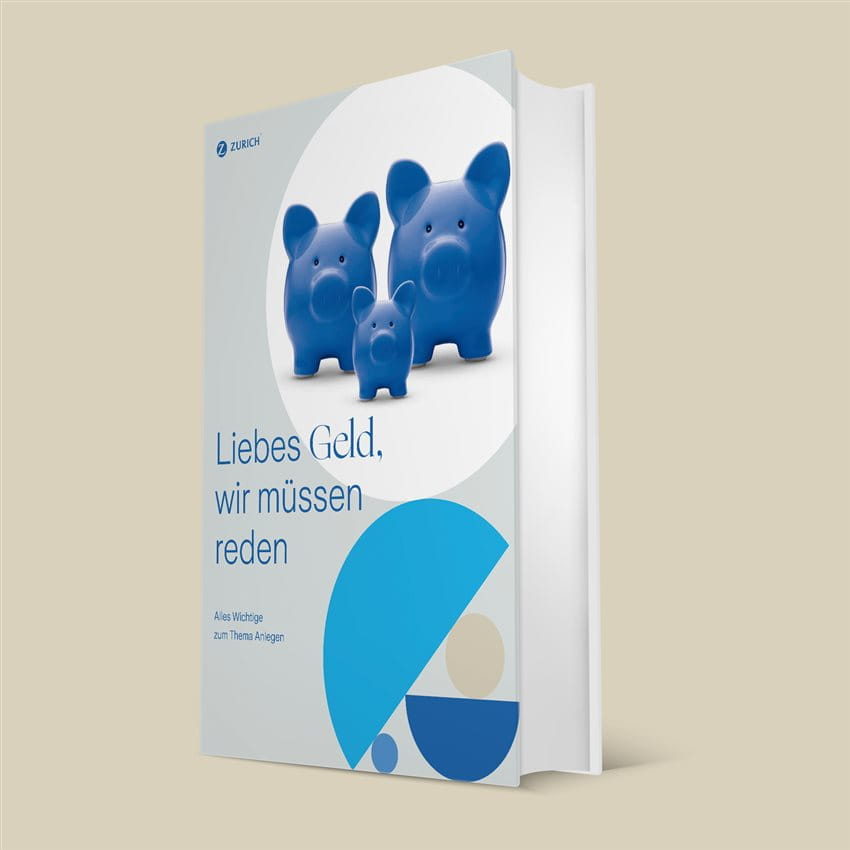Understanding needs:
Investment advisory
Everything you should know about our investment solutions
Our investment solutions focus consistently on proven investments. Increasing assets in the long term is more important to us than a short-term gain. That's why we invest your assets according to our proven four-stage model.
Stage 1: Securing your livelihood

Your income is the foundation for your financial security. At present, this consists of your salary; later, it is composed of your state (first pillar), occupational (second pillar) and private (third pillar) pension benefits.
Stage 2: Accumulating wealth

Before we start on systematic wealth accumulation, we analyze assets and take account of your liquidity requirements up to retirement. This includes the financing of your home, if you own residential property or want to buy some.
Stage 3: Optimizing capital

Based on your personal situation and financial goals, we define your investor profile and determine your personal investment strategy with you. In this way, you can be certain that the investment solution fits you and your needs.
Stage 4: Identifying additional scope

With the money that you don't need for achieving your long-term financial goals you can take advantage of attractive investment opportunities or invest in coveted collector's items like classic cars or art.
What makes Zurich's investment advice unique?
Good advice starts with the soothing sense of being in the right hands. For us, your wishes and goals are the top priority. That's why we create your individual investor profile and your personal investment strategy with you. It is important to us that you know and understand how we invest your assets and what you can expect from your investments. We also make you aware of possible risks to your livelihood and of your pension situation. We offer you comprehensive advice and take account of both your investments and your insurance.
What documents do I need for an investment consultation?
We take account of all assets for your personal investor profile. This means that an up-to-date asset list, account and custody account statements from your bank, or your last tax return are helpful. These documents make it easier for us to provide individual advice and save you from additional clarifications.
What is Zurich's advisory approach based on?
When providing advice, we stick to our four-stage model consistently: Securing your livelihood – Accumulating wealth – Optimizing capital – Identifying additional scope. In the first tab, we explain the model in detail.
What is the best investment strategy?
There is no such thing as the best investment strategy. Otherwise everyone would invest in that way – and you wouldn't need advice. But there is such a thing as the best investment strategy for you, your financial situation and your goals. The greater the profit opportunities, the higher the investment risks. Your strategy depends on the level of fluctuation that you can and want to accept. We clarify these questions with you in the investor profile. We then use this to derive the best investment strategy for you.
How risky are the different asset classes?
The greater the profit opportunities, the higher the risks. Or: The lower the investment risks, the smaller the profit opportunities.
- Money market investments receive fixed interest and have a term of 12 months at most. Because they are invested for a short, defined period, fluctuations are low. If money is invested for longer than 12 months, we speak of a capital market investment.
- Bonds are more risky than savings accounts but less risky than shares. By buying or subscribing to a bond, you grant a company or state a loan that is paid back after the end of the term. You receive interest in return. Bond prices may fluctuate, for example if interest rates increase, but generally do so less than share prices.
- Shares provide a stake in a company and allow the shareholder to share in their success. Share prices fluctuate, depending on the company's success, but also on market developments, changes in interest rates and the economy, and political events. Successful companies pay dividends to shareholders as a profit share.
- Real estate is a material asset. You can invest directly or indirectly, for instance in real estate funds or shares in real estate companies. Real estate is subject to fluctuations in value, triggered by demand and changes in interest rates in particular.
- Alternative investments include investments in commodities, hedge funds or infrastructure funds, which do not belong to a traditional asset class. They are not usually very liquid and have a complex structure. Alternative investments enable you to make better use of investment opportunities and to diversify your assets more broadly.
- Derivative instruments are options on underlying assets, such as shares. Their price depends on the underlying asset. With a share option, you can, for example, buy (call option) or sell (put option) a share at a specified price. Derivative instruments are complex. They are only suitable for investors who understand the mechanisms and can shoulder the risks (total loss).
What exactly are assets?
Assets include all permanent property and rights. A distinction is made between monetary items such as cash, bank assets or bonds and material assets such as shares, precious metals, real estate or commodities.
What are monetary risks?
These are the four most important risks:
- Liquidity: Before you invest, you should ensure that you have sufficient liquid funds at all times to be able to pay for unexpected expenses, for instance dental work. In this way, you avoid the risk of having to sell long-term investments at quite possibly the most stupid moment.
- Inflation: When money falls in value, we speak of inflation. If, for instance, you invest your assets in a savings account, there is a risk that your money will lose value and so purchasing power due to inflation.
- Concentration risk: History teaches us that all markets, sectors and companies go through good and less good times. For this reason, you should never stake everything on one chance, for example by investing in just one asset, but should spread the risk broadly (diversify).
- Currency: Higher interest in foreign currencies is attractive. The flip side of the coin is the currency risk. For instance, in the year 2000 many investors invested in U.S. dollars at a price of CHF 1.80. One U.S. dollar is now worth less than one Swiss franc. Despite higher interest rates, the investment failed to pay off. That's why you should also diversify your investments with respect to currency.
What role do life risks play in investment advice and asset planning?
If you die or are left unable to work after an accident or an illness, state and occupational retirement provision come into play. Generally however, such pensions are not sufficient to enable you to continue to enjoy your accustomed standard of living. With this in mind, you should insure yourself and your family against these risks:
- Disability: In Western Europe, one in every four people is unable to work due to illness or accident – at least temporarily. If you insure yourself against loss of income, you close the benefit provision gap for yourself and your family.
- Death: Nobody likes thinking about death. Nevertheless, you should take out term life insurance to provide assistance in the event of death. It means that your family will not need to worry about finances and their future in the midst of their grief.
In our comprehensive investment advice and in our 4-stage model (Stage 1: Securing your livelihood), we set great store by protecting against risks that threaten your livelihood.
What does diversification mean in investment advice and asset planning?
Diversification means the distribution of risk. A beach vendor who only sells sunglasses will do good business on sunny days, but will sell very little when it rains. Had they supplemented their range with umbrellas, they might also make sales on rainy days. This principle also applies to investments: If, for example, you invest in just one company, the danger of total loss is greater than if you had invested in many companies. Or in one share fund that invests in many companies and so spreads risk broadly. Diversification costs hardly anything and is most easily realized with investment funds.
When is the best time to accumulate wealth?
Now. The earlier you begin, the more quickly it pays off thanks to the compound interest effect. For instance, if you want to save up CHF 100,000 and expect a yield of 3.75 percent, you would have to put aside CHF 688.10 each month for 10 years – or just CHF 155.50 each month if you have 30 years to reach your savings target. The basis for a successful monetary investment is a medium- to long-term time period and the right investment strategy for you.
How should investors behave in times of uncertainty?
Stay calm and don't act rashly based on fear or panic. In times of uncertainty, it is important to stick to the strategy with discipline. Ups and downs are part of the stock market. In the long term, investments in securities – and in shares in particular – pay off.
Price corrections are an opportunity to get on board. So in times of uncertainty, you shouldn't stop investing with a savings plan or monthly payments. If you leave your money in a savings account, it will keep on depreciating in value due to inflation (see "What are monetary risks?").
In Investing in times of uncertainty, you can read what Zurich experts are recommending now.
What investment solutions make sense in the current situation?
Prices for energy, food and commodities are increasing. Inflation has a stronger influence on monetary assets such as cash, bank balances and bonds than it does on material assets such as shares, precious metals and real estate. For this reason, it makes sense to invest in material assets too. In times of uncertainty, the knowledge of professionals is even more valuable. That's why we recommend that our customers seek advice. Arrange a personal consultation now. We will review your strategic asset distribution and make suggestions as to how you might optimize your investment strategy.
In Investing in times of uncertainty, you can read what Zurich experts are recommending now.













